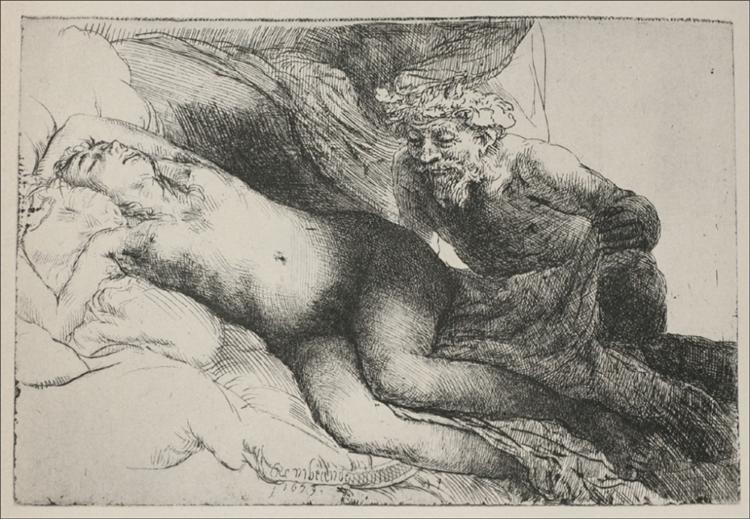Descriere
Rembrandt's 1659 painting Antiope and Jupiter is a fascinating example of the Dutch master's talent for creating complex visual narratives through light, shadow and emotion. In this painting, Rembrandt displays his characteristic mastery of chiaroscuro, a technique that enhances depth and drama, giving the scene an intensity that transcends the mere portrayal of his mythological characters.
In the painting, Antiope, who is depicted reclining in an intimate setting, appears to be in a state of vulnerability and resignation, while Jupiter, in his godly form, is close and protective. Rembrandt’s handling of his figures is remarkable: Jupiter is depicted with a majestic bearing, but his position can lead to multiple interpretations. This ambiguity is one of the central features of the work; there is an emotional interaction that suggests both a tangible connection and an avalanche of power and domination. Jupiter extends his arm over Antiope, reinforcing his role as the sky god and protector, but also inviting us to question the balance of the relationship, a dynamic element that challenges the classical notion of heroism and vulnerability.
The colour palette Rembrandt chooses is a crucial aspect of the painting. A bold use of gold, brown and subtle human skin tones establishes not only the quality of the environment, but also the emotionality of the characters. Dark shades create a background that highlights the figures, while the subtle use of light on Antiope's skin gives an almost ethereal air. The nuances of light reinforce the notion of intimacy and psychological closeness between the characters, which are shown in a scene charged with symbolism and narrative.
As in many of his works, Rembrandt uses space not only to position the figures, but to give voice to the story his characters tell. The composition is deliberately asymmetrical, guiding the viewer's eye through the shapes and textures, from the rich clothing to Antiope's pale skin, all converging in the visual encounter between the two figures. The dark background serves as a notable contrast, providing a sense of isolation and depth, generating an environment in which the interaction between the divine and the human is made manifest.
This painting coincides with a period of exploration and reflection in Rembrandt's work, in which he focuses not only on the representation of the human figure, but on the true complexity of human emotions and relationships, especially in mythological contexts. "Antiope and Jupiter" is comparable to other works of his that portray stories from the past, such as "The Anatomy Lesson of Dr. Nicolaes Tulp", where he also observes the interaction of light and the human figure, but from a more rational than emotional perspective.
Interest in mythology is a common thread in 17th-century art, and Rembrandt is no slouch when it comes to exploring the connection between myth and the human condition. The depiction of Antiope, which traditionally embodies vulnerability in the face of divinity in classical mythology, is meticulously thoughtful in capturing the inherent fragility of the female figure, which is at the epicentre of this visual narrative.
In conclusion, Rembrandt's Antiope and Jupiter is a work that speaks to the artist's mastery in depicting the complexity of human emotions through a deeply resonant visual interplay. Rembrandt's ability to intertwine light, shadow, and emotional experience marks a milestone in art history, leaving a legacy that continues to inspire and fascinate critics and art lovers alike.
KUADROS ©, a famous painting on your wall.
Hand-made oil painting reproductions, with the quality of professional artists and the distinctive seal of KUADROS ©.
Painting reproduction service with satisfaction guarantee. If you are not completely satisfied with the replica of your painting, we will refund 100% of your money.

